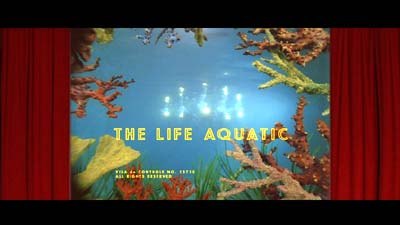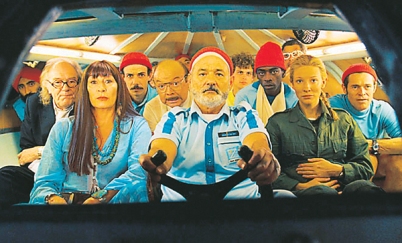A part of this viewing list: Criterion Collection Spine #300: Wes Anderson’s The Life Aquatic with Steve Zissou.

I don’t like Wes Anderson films for the same reason I don’t like Quentin Tarantino films and the same reason I don’t like most of my poetry. It is all too referential. Yet, The Life Aquatic with Steve Zissou was enjoyable enough, mainly because many of the references were actually things I knew about [documentary filmmaking, David Bowie]. I still don’t get his appeal though. I’ll try to dismiss my loathing for self-reflexive-obligatory-oblique-retro-pomo-irony long enough to point out what I found effective in the film.
Steve Zissou is an oceanographic explorer who makes documentary films of his adventures, a la Cousteau. He is posturing, arrogant, selfish and emotionally distant. His entire life has consisted of crafting and maintaining a celebrity image; resulting in a man who has forgotten who he is in favor of chasing after the man he watches on screen. We constantly see the filming of his documentaries; which are just as choreographed as Zissou’s private life. In fact, Zissou has been in front of the lens for so long, he has forgotten that the camera isn’t always rolling. His desire for drama is born from an extended slump in the reception of his documentaries.
It should be noted, however, that while The Life Aquatic with Steve Zissou [the movie within the movie] is a rather obvious send-up of reality television, in its essentials it doesn’t differ from true documentary filmmaking at all. Real documentaries are not the objective testimonials that we instinctively believe them to be. Things are shot and not shot, things that were shot are left out, commentary is added in, the editing gives the film some sort of syntax, and often turns it into a narrative.
The use of Kodachrome [at least, that’s what it looks like to me] for the film within a film clips was nice, since I’ve always liked how the warm colors pop out with that stock, and though the awkward framing and disconcerting cuts made me a little seasick, they did seem to strengthen Anderson’s portrait of Zissou as a man alienated from himself. The Bowie translated to Portuguese is another inspired choice in this regard.
Yet with all of this staging, the most important parts of Zissou’s story never get filmed. [That is, if we’re watching with a standard view of spectatorship and assuming that the 4th wall still exists and that TLAwSZ was made by Wes Anderson and not Steve Zissou making TLAwSZ about making TLAwSZ]. When he meets his son, when he fights off pirates, when he saves his nemesis from pirates, when his son is killed in a helicopter crash…no cameras.
These constant blows, coupled with the difficulties of financing the film, eventually force Zissou to make peace with his inner demons, symbolized tangibly by the jaguar shark.
If we watch the film in House of Leaves mode and pretend that Wes Anderson didn’t direct it and that Steve Zissou made a film called The Life Aquatic with Steve Zissou about making a documentary called The Life Aquatic with Steve Zissou, then nothing that we see in the film can be considered non-fiction. Especially since his dead partner Esteban and dead son Ned both appear on screen after their deaths.
Ultimately I think this movie [and most Wes Anderson films] would succeed a bit better if there were less attempts to say something about everything as intricately and obliquely as possible. To deliberately mix some metaphors in a self-reflexive-obligatory-oblique-retro-pomo-irony way, I think the multiple paths of meaning both drown the others out and are weakened by their profligacy.

• DVDTalk Review of the film and the Criterion DVD
• New York Magazine story on Wes Anderson
• Cousteau.org